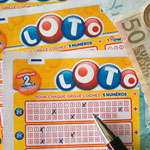International Lottery Day Date in the current year: August 27, 2026
 August 27 is the perfect day to try our your luck and buy a lottery ticket or two since it is International Lottery Day. The holiday celebrates one of the most common forms of gambling that has changed many people’s lives.
August 27 is the perfect day to try our your luck and buy a lottery ticket or two since it is International Lottery Day. The holiday celebrates one of the most common forms of gambling that has changed many people’s lives.A lottery is a form of gambling based on drawing random numbers for a prize. Lotteries are one of the oldest forms of gambling. There is evidence that a gambling game similar to keno where players wager by choosing numbers existed in China during the Hang dynasty (202 BC – 200 AD). These early lotteries are believed to have been organized as a source of financing for major government projects, including the construction of the Great Wall of China.
The first references to lotteries being held in Europe date back to the Roman Empire. Early Roman lotteries did not involve ticket sales and were merely an amusement for the wealthy during dinner parties. Each guest received a ticket that they would later exchange for a prize. Every ticket holder won something, so it was not so much of a gambling game and more of a way to distribute gifts. The first Roman lottery that involved selling tickets was organized by Emperor Augustus to raise money for repairs in the capital.
In Medieval Europe, public lotteries were held by Bruges, Ghent, Sluis, Utrecht and other towns in the Low Countries to help the poor and raise funds for fortifications or other public usages. The first records of these lotteries are dated to the 15th century, but some town records contain indications that they may be older than that.
Around the same time, the first lotteries were organized in Milan and Genoa. They were discovered by King Francis I of France during his Italian campaign, who authorized lotteries in France as a source of revenue for the state budget. The first official lottery in England was held by Queen Elizabeth I in 1566.
In colonial America, lotteries were an importance source of financing for both public and private ventures. Revenues from selling lottery tickets were used to finance the building of bridges, roads, canals, schools, colleges, libraries, and even churches. During the American Revolution, lotteries were held by the Continental Congress to raise money for the Continental Army.
Today, the attitude toward lotteries varies depending on the country. They are outlawed in some counties and allowed in others. Some governments actively endorse lotteries to the extent of holding a national lottery. In most cases, lotteries are regulated by the government to at least some degree. As a rule, vendors are required to obtain a special license in order to sell lottery tickets, and minors are not allowed to buy lottery tickets.
The origin of International Lottery Day is unclear, but it is generally believed that the holiday was first celebrated in the United Kingdom and has spread across the world from there. The best way to celebrate it is, of course, to buy a couple of lottery tickets or gift a lottery ticket to your friend. Maybe you will win, maybe you won’t, but it never hurts to dream!
- Category
- International Observances, Unofficial Holidays
- Tags
- International Lottery Day, international observances, unofficial holiday, forms of gambling, gambling games, lottery